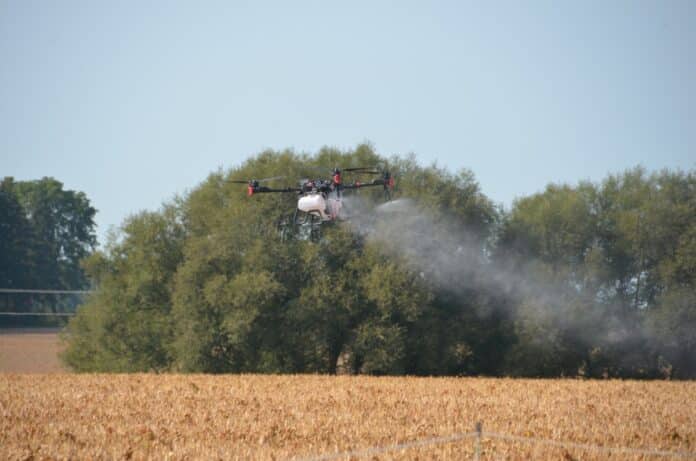
by Nelson Zandbergen,
courtesy of Farmers Forum
Canadian farmers are quietly rebelling against federal rules that prohibit spraying agriculture’s most important crop chemicals with drones, according to industry insiders.
Under the radar, some fed-up Ontario farmers are opting to spray with drones anyway.
For the better part of a decade, American farmers have been using drones to spray popular herbicides and pesticides. They’re allowed as long as those chemicals are already approved for use with conventional aviation crop-dusting. Canadian regulators have resisted this blanket approach, insisting instead on a separate drone certification for each product. It’s a go-slow, bureaucratic process that appears to be years away from allowing drones to apply the pesticides common in farming. That includes the crucial fungicides sprayed on Ontario corn – often by helicopter.
Markus Weber, an Edmonton based vendor of the biggest agricultural drones from manufacturer DJI, said that Health Canada’s Pest Management Regulatory Agency is holding up approvals while proving unable to enforce its rules.
“This is a year full of drama,” Weber said. “The farmers are way out ahead of the regulators. The cat’s out of the bag.”
Weber, who emphasized that he doesn’t condone breaking the law, estimated that “hundreds” of people in Western Canada are having crops drone-sprayed with products not currently approved for use with drones. The Ontario number would be in the “tens,” he suggested, with most being farmers using their own drones.
One operator – a Southwestern Ontario farmer who agreed to speak with Farmers Forum on condition of anonymity – has been spraying crops with a large drone that he’s owned for the last two years. Most of his work has involved spraying fungicide on his own corn fields and on those of paying customers. He charges $16 per acre and covers about 35 acres per hour. This year, in his second season of operation, he sprayed 6,000 acres and served 15 customers.
“It’s my mid-life crisis. It’s better than a Corvette, or a bad habit,” he quipped. He hopes to build a customer base that sticks with him beyond the black market, assuming Canada finally legalizes the practice.
Markus Weber’s company, LandView, demonstrated the largest available drones at Canada’s Outdoor Farm Show in Woodstock. Roughly as large as a tractor tire, a DJI T-50 drone flew low over a cornfield. The $40,000 unit zipped along over the tassels, trailing a tantalizing mist of nothing but plain water. “Of course, it’s a tease,” Weber acknowledged, in light of the current restrictions.
In reality, an agricultural drone, because of its very low flight path, should be regulated “as a backpack sprayer,” he said.
Meanwhile, civil aviation authorities at Transport Canada aren’t interested in enforcing Health Canada’s spraying rules, he added, and are actually making it easier for farmers to get into the drone game this year with reduced licensing requirements set to take effect this fall or next spring.
Drones are currently allowed to broadcast only fertilizer and seed in Canada. The only pesticides permitted to date have no use in agriculture: mosquito larvicides and a tree defoliant used by hydro crews.
Just how restrictive are the rules right now?
Adrian Rivard, operator of a law-abiding, above-the-board drone company, found out that he’s even prohibited from spraying a completely natural substance. The Chatham-Kent resident noticed that one pesticide – used to kill mites – is 97% canola oil. So he inquired with Health Canada if he could potentially spray 100% canola oil from his drone instead. The answer was still no. “I can’t spray canola oil onto my canola fields,” Rivard remarked.
